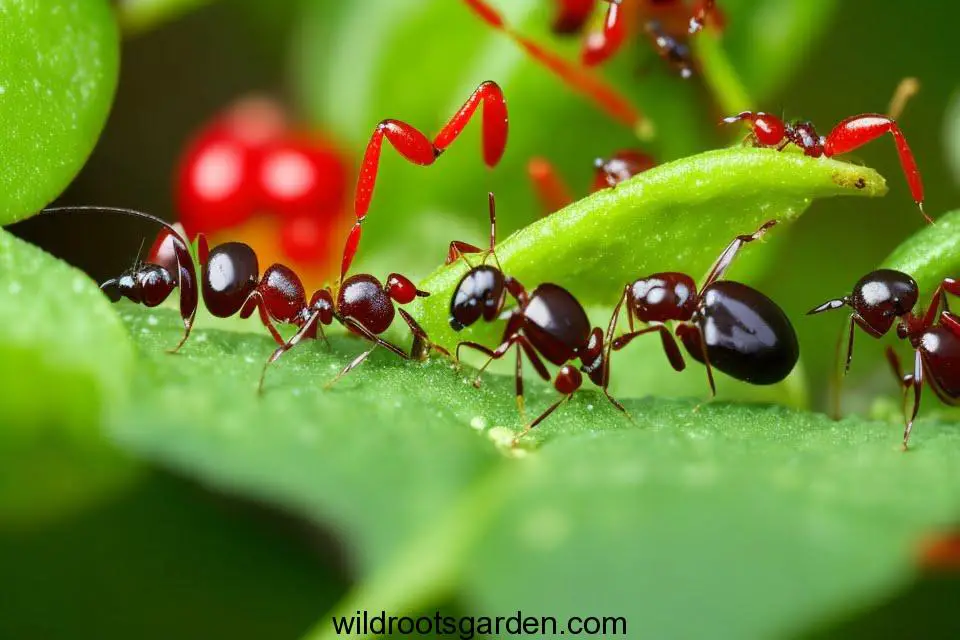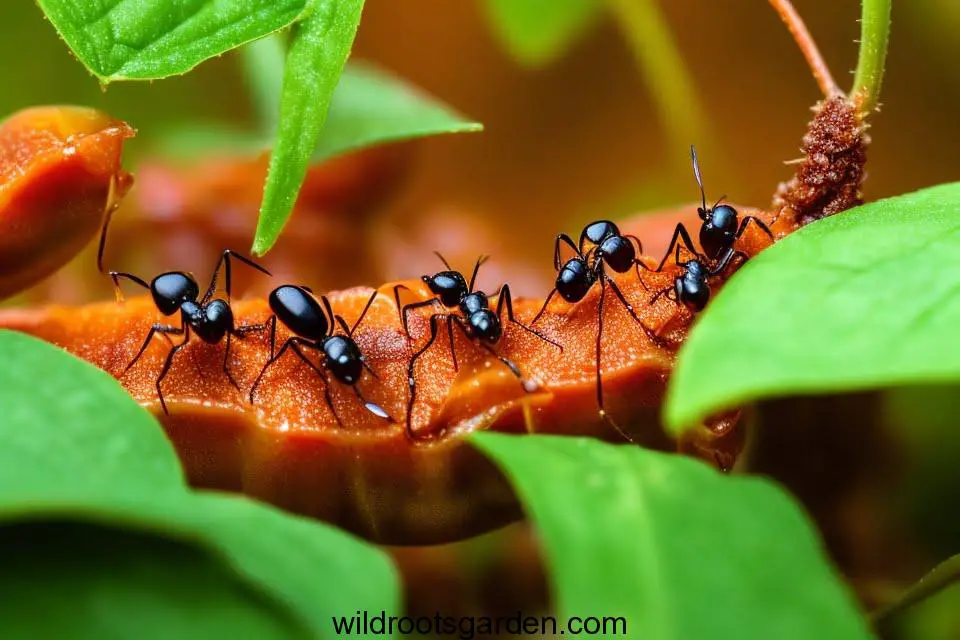JUMP TO TOPIC
- 1 Introduction
- 2 Why Are Ants Attracted to Pepper Plants?
- 3 Identifying Ant Infestations on Pepper Plants
- 4 Prevention Techniques for Ants on Pepper Plants
- 5 Natural Remedies to Control Ants on Pepper Plants
- 6 Chemical-Based Solutions for Ant Control
- 7 Additional Tips for Managing Ant Infestations
- 8 Conclusion
- 9 FAQs
Introduction
Because of their vivid colors, distinctive flavors, and adaptability in the kitchen, pepper plants are a popular choice for home gardeners. Nonetheless, many garden aficionados may be alarmed by the presence of ants on pepper plants. Ants may not only harm plants, but they can also draw in other pests. This article will examine the factors that make pepper plants attractive to ants, how to spot ant infestations and efficient ways to avoid and manage them.

Why Are Ants Attracted to Pepper Plants?
For a variety of reasons, pepper plants are attractive to ants. The sweet, gooey liquid known as honeydew, which is secreted by sap-sucking insects like aphids and other pests that frequently infest pepper plants, is one of the main contributing factors. Honeydew is a food source for ants since it gives them energy. Aphids are additionally known to be shielded by ants from natural predators, maintaining a constant supply of honeydew. Aphids on pepper plants can therefore unintentionally draw ants.
Identifying Ant Infestations on Pepper Plants
For the purpose of putting in place efficient management methods, it is critical to correctly identify ant infestations on pepper plants. Common indications of ant activity include:
1. Visible ant trails
Keep an eye out for ant trails in the plants and the environment around them. Ants typically move along trails that are clearly marked between their nests and food sources. These trails can be seen creeping through the pepper plants’ stems, leaves, or dirt.
2. Ant nests
Search for ant nests in the dirt nearby or at the base of the pepper plants. Ant nests come in a variety of shapes and sizes, from modest mounds to intricate caverns. Determining the type of ant species can also help with choosing the best control strategies.

3. Damage to plants
Keep an eye out for any symptoms of damage on the pepper plants. Although ants can not directly injure plants, they can help other pests like aphids or whiteflies infest the plants. These pests may result in plant structure distortion, reduced growth, and yellowing of the leaves.
Prevention Techniques for Ants on Pepper Plants
Taking proactive measures to prevent ant infestations can help maintain the health and vitality of your pepper plants. Consider the following prevention techniques:
1. Clean and tidy garden area
Keep your garden area clean and free of debris that may attract ants. Remove fallen leaves, decaying vegetation, and other organic matter regularly. This reduces potential nesting sites for ants and other pests.
2. Create physical barriers
Put up physical barriers around the base of the pepper plants, like petroleum jelly or adhesive tape. Ants may be deterred from scaling these barriers to the leaves or fruit by the plants.
3. Eliminate aphid infestations
Aphid treatment is essential because ants are frequently drawn to pepper plants by the presence of aphids. To keep aphids away, use neem oil sprays or organic insecticidal soaps. Check the plants frequently, and eliminate any aphids by hand right away.
Natural Remedies to Control Ants on Pepper Plants
You can take into account applying natural treatments to control their numbers if ant infestations continue after preventative actions. Here are a few efficient strategies:

1. Diatomaceous earth
Diatomaceous earth of food grade should be applied all around the pepper plants’ bases. This fine powder works by drying up and harming the ant exoskeleton. It is made from fossilized algae. Plants may use it without harm, but ants cannot.
2. Citrus-based sprays
By boiling citrus peels in water and filtering the resulting liquid, you can make a citrus-based spray. To deter ants, mist this mixture onto the plants and the surrounding area. Ants dislike certain natural substances found in citrus oils.
3. Cinnamon
Around the pepper plants’ bases, scatter cinnamon powder. Ants can be discouraged from visiting the plants by the potent aroma of cinnamon.
Chemical-Based Solutions for Ant Control
Chemical-based treatments for ant infestations may be required in extreme circumstances. It’s crucial to carefully follow directions and take the environment’s potential effects into account. Here are a few possibilities:
1. Ant baits
Put ant baits next to the pepper plants that are harmed. Ant baits combine appealing ingredients with pesticides. The entire colony is effectively wiped out when the ants eat the bait and bring it back to their nest.
2. Insecticidal sprays
Use insecticidal sprays specifically formulated for ant control. Apply these sprays directly on the ants and their trails, as well as around the base of the pepper plants. Follow the manufacturer’s instructions for safe and effective use.
Additional Tips for Managing Ant Infestations
Consider the following additional tips to manage ant infestations effectively:
- Regularly inspect the pepper plants for signs of ant activity and take prompt action.
- Encourage natural predators, such as ladybugs or lacewings, which feed on ants and aphids, to populate your garden.
- Rotate your pepper plants annually to prevent the buildup of ant colonies and other pests in the soil.
- Maintain a healthy balance in your garden by practicing proper watering, fertilization, and overall plant care.
Conclusion
It can be difficult to deal with ants on your pepper plants. But, you may efficiently avoid and control ant infestations with the appropriate information and preventative steps. You can ensure the health and productivity of your pepper plants by keeping your garden tidy, keeping ants away from physical barriers, and using natural or chemical-based therapies as necessary.
FAQs
Q1: Can ants directly harm pepper plants? A1: No, ants do not directly harm pepper plants. However, they can attract other pests, such as aphids, that can cause damage.
Q2: How can I identify ant trails on my pepper plants? A2: Look for visible trails of ants crawling along the stems, leaves, or soil surface of the pepper plants.
Q3: Are there any organic methods to control ants on pepper plants? A3: Yes, natural remedies like diatomaceous earth, citrus-based sprays, and cinnamon can help deter ants from pepper plants.
Q4: When should I consider using chemical-based solutions for ant control? A4: Chemical-based solutions should be considered in severe cases where natural remedies have been ineffective.
Q5: How can I prevent ant infestations in my garden? A5: Keeping your garden area clean, creating physical barriers, and controlling aphid populations are effective preventive measures against ant infestations.

